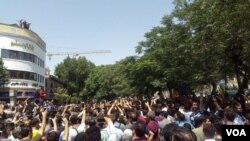Hundreds of Iranians in Tehran have joined street rallies against the country’s worsening economic conditions, creating the biggest anti-government protest in the Iranian capital in years.
Monday’s protest began at Tehran's Grand Bazaar, where Iranian state media and witnesses said shopkeepers shut their doors to protest the lack of business and the rial’s falling value, which has dropped 50 percent against the dollar in the past six months.
Video clips verified by VOA Persian and sent by Tehran residents showed hundreds of striking shopkeepers and other protesters marching through the streets of central Tehran near the bazaar and chanting anti-government slogans.
Watch: Iranians stage anti-government protest in central Tehran, June 25, 2018.
In one clip, crowds chanted slogans accusing Iranian authorities of incompetence and lack of feeling.
Watch: Another scene from anti-government protest in central Tehran, June 25, 2018.
In another video, demonstrators chanted “Neither Gaza nor Lebanon — my soul sacrifices only for Iran.”
The Iranian government's long-running supply of weapons and other resources to Islamist militant allies in Gaza, Lebanon and other parts of the region has angered many Iranians who say the money should be spent on fixing economic problems at home. Chants against that practice have been heard in frequent, small-scale anti-government protests across Iran since December, mostly outside Tehran.
Watch: Iranian riot police fire tear gas at protesters in central Tehran, June 25, 2018
Multiple videos of Monday’s protest shared on social media also showed Iranian security forces firing tear gas at some of the protesters in central Tehran.
Iranian state news agency Tasnim quoted Ali Fazeli, the head of Iran’s Chamber of Guilds business association, as saying that the protest at the Grand Bazaar had fizzled out later Monday.
The protest coincided with the Iranian rial weakening to a record low of 90,000 to the dollar on the black market in recent days. Iran’s government set an official, fixed exchange rate of 42,000 rials to the dollar earlier this year and banned trading at other rates to try to stop the rial’s decline, but black market activity has continued.
The rial has been under pressure since the U.S. withdrew from the 2015 Iran nuclear deal last month and started the process of re-imposing U.S. sanctions on the Iranian economy.
In an interview with VOA Persian, Iranian-American economist Siamack Shojai, dean of the Cotsakos College of Business at William Paterson University in New Jersey, said the rial’s slump has put the shopkeepers of Tehran's Grand Bazaar in a dilemma.
He said one option for the shopkeepers is to illicitly use the black market exchange rate to price their products, which would cover their costs of acquiring those products but also make them much more expensive for customers. Shojai said the shopkeepers’ other option is to price their products using the official exchange rate, which would keep prices affordable for customers but leave those shopkeepers with considerable losses.
The dollar’s surging black market value also has led the Iranian central bank to ration its supply of the U.S. currency to Iranians, Shojai said.
In one move aimed at conserving those dollar reserves, Iranian Minister of Industries, Mining and Trade Mohammad Shariatmadari has banned the import of 1,339 products categorized as “non-essential goods” that he said can instead be produced within the country. Iran’s Financial Tribune newspaper announced the ban in a report published Monday, attributing a letter by the minister dated June 20.
This report was produced in collaboration with VOA's Persian Service. .





